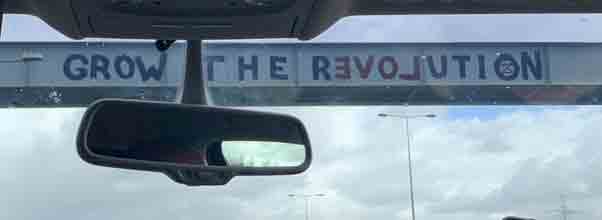
Alan Dearling spills the beans…
I absolutely love it when I discover a ‘new-to-me’ artist. In almost any genre. Innes Watson was such a find. A couple of weeks ago down in Todmorden, West Yorkshire, I was introduced to the music of Innes when I bought his album, ‘Innes Watson’s Guitar Colloquium’ (2018). I thought the cover looked a bit psychedelic, and read in the sleeve notes:
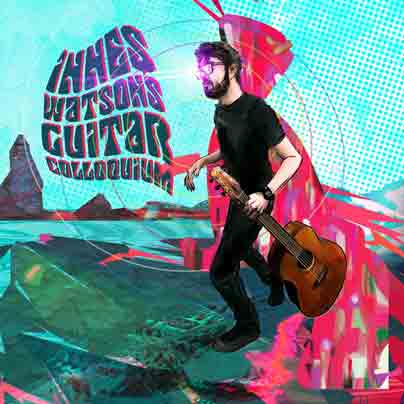
“Glasgow was a mad place for contemporary music between the year 2000 and 2015!…it was a hive of activity for tunes, sessions, gigs, parties and a LOT of fun…it was amazing, we were a community of pals…ferocious friendship! The declaration of ‘Waste’ was born and stood for, ironically, the immense bond we all felt through getting really fucked up and playing tunes together! It wasn’t a waste at all, on the contrary…from this era spawned most of my contemporaries’ careers.”
I was intrigued. Playing the music I was then rewarded with some drop dead gorgeous guitar playing. It’s instrumental, mostly solo, but complemented by some tracks with his erstwhile ‘Wasters’. Innes has oodles of talent, and his material has a uniqueness that offers immediacy combined with an edgy freshness that makes one smile with admiration.
Here are some samples:
https://inneswatson.bandcamp.com/
https://www.youtube.com/watch?v=f4Zt3cNQB2I
Innes is also a fine fiddle player, and, with his mates in the Treacherous Orchestra, can kick up a Mighty Stushie (Noise/Party/Storm)! The Treacherous Orchestra: https://youtu.be/4aZO8XDl-4g
I read some more about him on line:
“Born in Glasgow, brought up in the Borders, Innes has carved himself a deep groove in the face of contemporary and traditional folk music of Scotland. Alumni of the National Centre of Excellence in Traditional Music in Plockton and a graduate of the Bachelor of Arts in Scottish Music at the Royal Conservatoire of Scotland, Innes is now a leading tutor in instrumental performance at the RCS and the University of the Highlands and Islands. He is also renowned as one of Scotland’s best instrumentalists, being awarded ‘Instrumentalist of the Year’ at the 2009 Scots Trad Music Awards at the age of 24.”
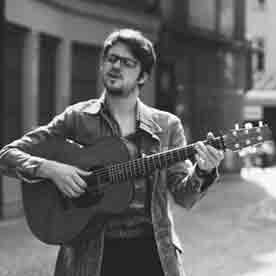
He’s part of a Guitar Legacy. The Colloquium album reminded me of the ground-breaking guitar playing of my 1960s, growing-up days. The innovations of Dav(e)y Graham on string-bending, East meets West, from ‘After Hours’: https://www.youtube.com/watch?v=a9XkWbKBs80
Shades of Bert Jansch and John Renbourn, before and after they were in folk-jazz fusion band, Pentangle. Here’s ‘Bells’ from 1967: https://www.youtube.com/watch?v=L6Q_M6aTUbs
Memories of John Fahey’s weird tunings and strange timings of ‘In Search of Blind Joe Death’. Here’s ‘Red Pony’ from 1969: https://www.youtube.com/watch?v=YSh-YsyjpXk
Another guitarist with some fine instrumentals is Al Stewart. Here’s his ‘Small Fruit Song’ (1970): https://www.youtube.com/watch?v=RRbhHxCnMhs
**********************************************************************************
So – as you do – I contacted Innes online, seeking an interview. A chat about music and creativity. I reminded him, prodded him. And now, this is the result! Enjoy – and especially go listen to his music, meet his musical mates. Make him your New Musical Friend!
Alan and Innes in a musical banter
Alan: Thanks for the chance of chat. First up – I really love the ‘Colloquium’ album. It seems a mix of the mellow and exuberant. Fun. It has a buzz about it. Tell me about making it.
Innes: So glad you like it! It was a concept album that I wrote for a Celtic Connections’ performance in the New Voices series, 2011. I gathered like-minded players who wouldn’t usually play together as we were all accompanists within the scene, mainly. All being close acquaintances in a very friendly music scene in Glasgow helped my idea of a fun ‘living-room party protocol’ to take to the stage and I’ve tried to maintain that ever since. I feel that relaxed performances are better for audience and performer and I’m SO glad that comes across in the album as well. Due to availability it was tough to get everyone together to record but small groups helped that feel I guess. Initially Ali and myself played the ‘grounds’ of the album with Duncan (bass) and Alyn (kit). Barry was at the engineering helm on those sessions but joined Chas and myself in recording a later session with Andrea engineering. Then strings and guests were added at another later date. So we were all together in a way. The very end of the album has an initial reaction from the strings to a comical false ending by Alyn that spanned the whole project. A joke that started in 2010 and still lives on to this day at the end of the CD! Ten years and counting…
Alan: There’s more than a hint of jazz as well as Scottish music in the Colloquium album. Is that still part of your repertoire?
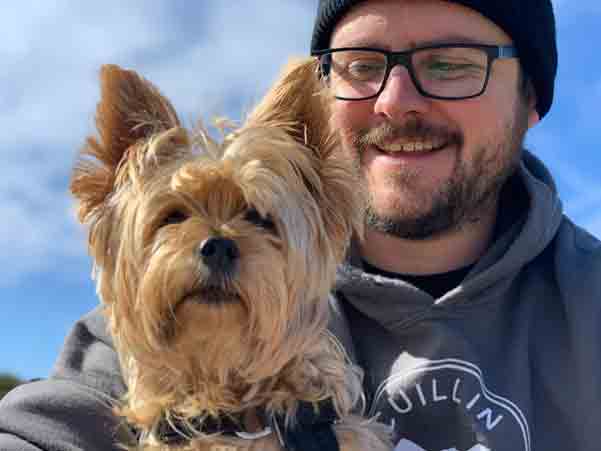
Innes: Yeah, it is. I’ve always been in awe of jazz musicians and learned a lot from their dedication to spontaneity, in fact all the great trad/folk musicians I’ve listened to have had their forays into jazz or at least hooked up with musicians from the scene and in many ways our scenes are intertwined, especially now in Scotland. Traditional music has really taken on its role as an evolving art/culture as it always did and we’re really no different these days in that respect.
Alan: You seem to be a great collaborator…what are some of the highlights of those musical conflabs?
Innes: Well, one of the things that got me hooked on music most was listening. I had a natural ability as a kid (so mum says anyway) to copy sounds I heard. That must have helped when picking up instruments after singing and making noises from birth. It’s really a continuation of learning how to speak: copying parents and sister and others’ noises they made. I like to think that musical communication has stemmed from that. If you listen to others’ well enough and can really understand what they’re saying (so much so that you can say it for yourself) then you can agree with them and complement their points of view. Something I’ll try to do in accompaniment or collaboration. With Ali Hutton, I listened to his guitar playing, piping and whistle playing and he opened up a world of understanding when I had to deputise gigs for him on guitar. Then I spent years filling the shoes of other great musicians on guitar, fiddle and in song: learning new voices all the time, allowing collaboration with so many great musicians.
Alan: Two of your link ups that I’m aware of are with Mike Vass and Jarlath Henderson…
Innes: Just two of the close friends I’ve been able to work with in duo form. I knew Mike and Jarlath respectively during my early twenties. We’d party and play tunes together and they started performing their own music involving me in a few different ways but mainly on guitar. We’ve all now spent so much time together it really is a relaxing experience to do gigs with them. We read each other very well. Two other musicians that tends to happen with, are John Somerville and Adam Sutherland. It feels like I can almost guess what they’re going to do before any of us know, you know. You don’t know what you know until you know what you don’t know, you know?
Alan: Your favourite instrument to play? Guitar or fiddle? Or…?
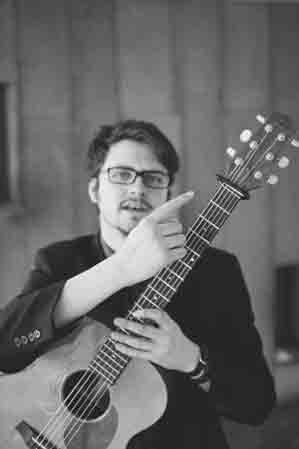
Innes: My favourite instrument is definitely my voice! Although when I sing songs now I try to convey my real voice, the one I speak with, but there is so much of the voice that I don’t use in performance yet! Noises and sound effects will creep into my music in future for sure. I started singing with falsetto and because it seems to come across as comedy people laughed. It will take some time for the ‘trad world’ to be comfortable with ‘pop vocals’ to blend seamlessly with traditional music. As ever, it’s a struggle between respecting the past and moving forward. Like my sister (Dr Lori Watson) says it’s very much like a see-saw. Balance is difficult, reach too far into the future and your past is up in the air. Reach too far into the past, where’s your future at?
I started guitar at 4 but didn’t really learn to play it until I had become competent on the fiddle/violin (years 7-23). Then becoming a notable guitarist among our scene I only then learned how much I had to offer on the fiddle. It’s been a back-and-forth until recently where now, I guess, I respect them both as tools with which I can convey everything I really want to, from the noises in my head… blah blah blah zip boing fizzle…
Alan: In my ‘Intro’ I’ve mentioned some of the guitarists who helped take folk into new musical dimensions…is that something you are interested in? Are they players you’ve listened to?
Innes: Absolutely, yeah, every one of them I’ve at least heard of if not listened to thoroughly! My father taught me guitar chords with songs from an early age (it took a while!) and he has an extremely eclectic taste in guitarists, folk musicians, singer/songwriters and all sorts of other genres. So we were brought up in a household with respect for any music and I have to say that still exists. Seeing the best in even the most ‘terrible’ of art-forms. There is something for everyone, and all of it is for me!
Alan: I sometimes feel that ‘folk’ has become a bit of a backwater. Contemporary folk got a shot of energy from the likes of Fairport Convention, Steeleye Span, the Incredible String Band and Run Rig… and there are always great new singer-songwriters, but somehow in current times, folk seems to mean Traditional Folk. I like it up to a point, but it sometimes seems a bit sterile, and up-itself. Sorry if that’s a bit confrontational!
Innes: FIGHT FIGHT FIGHT FIGHT! No, not at all. It’s good to be questioning these things. I would say that pigeon-holing has really F’d things up in this time of, almost, observed saturation. There are so many people on the planet that the exponential rise in youths taking up EVERY form of music is swelling so much that there comes a point when we all must eventually dislike the route something has taken. The pathways are motoring ever-outward from a point where we drew our understanding from originally. It’s natural for humans to seek out the new, but we are never going to stop feeling warm with nostalgia at the stuff that shaped us. Open-mindedness is harder than it’s ever been, and yet, without it, none of the fantastical evolutions in music would ever have been possible.
Alan: I also think that we need another generation of bands like the Pogues and the Levellers who gave contemporary folk a kick up the back-side…
Innes: Punk folk is essential. Breaking moulds, brilliant. However, have you ever thought about fixing the broken mould? It’s still different. It’s like healing a smashed pot with golden resin so you can see where it has been mended. The journey is written in, respecting where it has come from, what it’s been through and what it is now. I got that idea from a potter called Stef Baxter: http://www.stefbaxterpottery.com/
The shiny new music you hear that sounds perhaps ‘sterile’ is a true evolution of the likes of Bach. Bach wrote rough around the edges music in a Baroque period and yet it is played now in a tuned-up world with Italian ‘sports model’ violins with extreme precision. Sterile, but beautiful. It has never lost its soul and we still respect it. New trad (nu trad) and traditional folk and folk rock and funk soul and pop rock…they are all ways we try to explain things by putting them in understandable sections for our tiny little minds to compute. It’s greater than us, though. It is whatever you want it to be. If you don’t like it, don’t worry because there are hundreds/thousands/millions of people that will. Some things need saved, some things need fixed, some things need mended, some things need to be forgotten. Mistakes are made, evolution itself is frequently mistake by ‘design’. By merely talking about it, a kick up the backside is exactly what has happened. Well done us.
Alan: In the last couple of years I’ve enjoyed seeing Seth Lakeman and Lau live, but again they seem to be stuck on bills that are labelled ‘folk’, and that too often means a bit of a geriatric and musically conservative audience. Who do you rate at the moment?
Innes: Whipping up storms with younger audiences at the moment are the Elephant Sessions, Talisk, Rura (although they just grew up a whole bunch really quickly there in their last album), Ross Couper & Tom Oakes – I’m not an authority on what’s exploding in the youth market just now because, as I said before, there are SO MANY amazing young musicians out there doing it without regard for boundaries or partitions. In fact I think people may not emerge fully until such a time as they take a sharp turn to the diverse once they’re bored doing what they’ve cut their teeth on. Does that make sense? Younger audiences are very much made up of musicians themselves. At a festival gig you are likely to see faces of musicians you’ve encountered elsewhere and lots of them. We are all faces in crowds somewhere.
Alan: Scotland has always produced some powerful and individual contemporary folk musicians. I’m thinking of people like Dick Gaughan and Jackie Leven. Perhaps never household names, but very influential in musical circles. Do you see yourself as one of the new Scottish Pioneers?
Dick Gaughan, ‘Westlin’ Winds’: https://www.youtube.com/watch?v=vZ7oYCx6tBw
Jackie Leven, ‘Your Winter Days’: https://www.youtube.com/watch?v=R4gowq-88SU
Innes: Well I very much respect Scottish pioneer folk musicians whatever they have done with tradition, and I’d like to say I am a part of the great stream that is ever flowing. It takes a lot of us to bolster an ever-evolving culture through time. I would be honoured to be remembered as one of them, but it’s not essential.
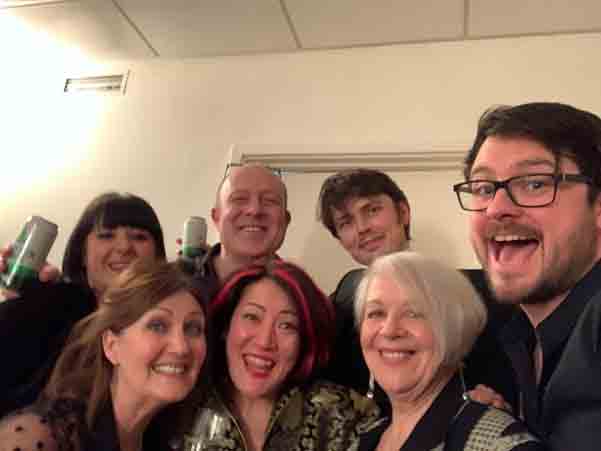
Alan: In the last 20 years I’ve been heavily involved in the festival scene in the UK and particularly in Europe. Dance and EDM music is a huge part of that. A Scottish artist who died tragically young who was moving in that direction, mixing traditional music and Dj-ing was Martyn Bennett. Are you interested in that sort of mash-up? This is an amazing Danny Macaskill video featuring Martyn’s ‘Blackbird’ track: https://realworldrecords.com/videos/danny-macaskill-the-ridge/
Innes: Funny you should mention him. He is one of my main inspirations. I was very fortunate to study in Glasgow and learned folklore from his mother Dr. Margaret Bennett. I also joined Croft No Five who were idolisers of Martyn and knew him well. So, although I never met him, I know a lot of the people who were close to him and because I devoured his music I feel a great affinity to what he was trying to do. I was very lucky to help Greg Lawson with scoring of some of the sampled sounds for the Grit Orchestra and earned myself a place in the orchestra as a vocalist! We played a live performance of ‘Blackbird’ with Danny doing stunts in the SSE Hydro as part of Celtic Connections 2019! That was spectacular.
Alan: I believe you’ve been recording a new album. Tell me about it.
Innes: During lockdown I was lucky enough to be visiting my girlfriend in Skye and became ‘trapped’ here. The best thing that could have happened to me at the time. I needed space and time. Skye blended with lockdown to give me everything I needed at that time. I didn’t have any of my studio belongings with me as I had just made the decision to move out of Glasgow before lockdown so all I had was my iPhone. I decided to record an album on it. It is now available on Bandcamp and there will be a CD available too for the hardcore folkies who still like something you can hold in your hand! https://inneswatson.bandcamp.com/album/shhh-im-on-the-phone
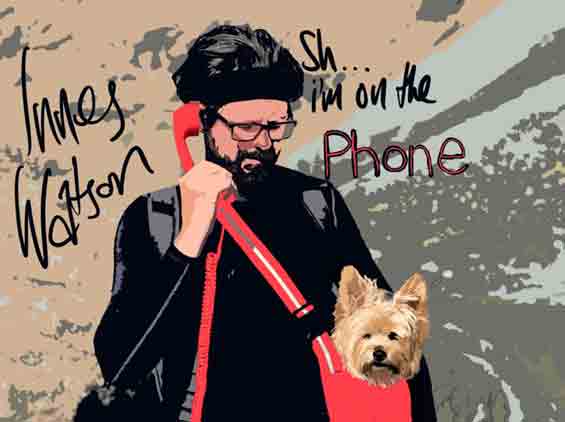
It all seems to have tied together quite nicely with me enacting the voice of Martyn in the Grit Orchestra’s live rendition of ‘Aye’ whilst holding an actual phone lent to me by Gordon Mclean of An Tobar on Mull (where Martyn spent a lot of his time) whilst standing next to his son Sorren on stage at the Hydro where most people will have seen me saying, “aye”, holding a phone. So a whole album recorded during lockdown on my ‘aye phone’ just made me smile and I had to do it.
Alan: I’ve watched some of the videos of the Treacherous Orchestra. That seems like a whole different ball-game. High octane energy. Fun and Noise. Audience pleasing. Are you still part of that?
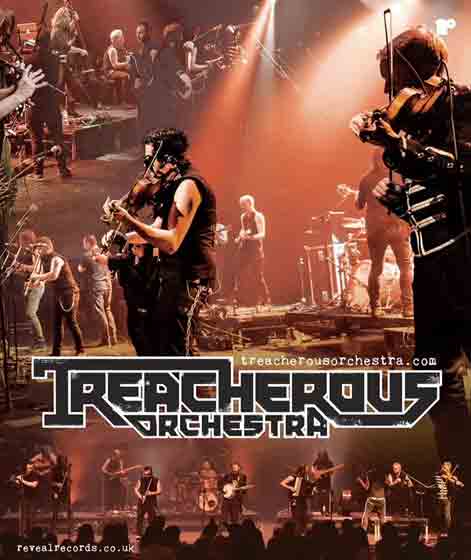
Innes: Yes we are. The economy of a 14-piece outfit on the road was getting hard with people settling down and having kids, moving to sensible places, going to the pub less etc! So we are still gigging but few and far between and they have to be made worthwhile. We are happy working on our own respective projects and still doing what we can to invigorate the scene as much as we can. The 2019 winner of the Scots Young Trad Musician of the Year actually asked me backstage at a festival last year if I thought it would be a good idea if we had a new Treacherous Orchestra for this generation and I told him they should go for it but warned that it’s costly, hard work, but A LOT of fun. Still unsure if he was ripping the piss or not but let’s say he wasn’t for now!
Alan: Covid and the lockdowns have been hard on all of us involved in the live music scene. How has it been for you?
Innes: As I said before it gave me space and time that was desperately needed. I suffer severe mental health issues exacerbated by the life I’ve led in the Scottish music scene. I had to take a break from teaching last year. Since then I’ve been floating around wondering what my purpose is and unable to fixate some positive energy on my career. I felt lost and privileged and guilty all at once so struggled to maintain focus amidst mental health issues. “The Great Pause”, as I have come to know it as, or Covid-19 has really brought some much needed space and time into my existence. I feel a lot more focussed and energised to do what I need to do.
I worried about a lot of people ‘stuck’ in cities during lockdown but gradually as we’ve all started to come out the woodwork a little it seems that most have made good use of “The Great Pause” to r&r in preparation for absolutely smashing the living bejeezus out of it when we’re all allowed to. I have felt that explosion of energy several times whilst thinking about it, quite worried for what comes next. I’m very excited.
Alan: I came across Duncan Chisholm’s Covid musical link-up for ‘Highland Cross’ – and you feature. Looks like fun… https://www.facebook.com/DuncanChisholmFiddle/videos/258712168910238/
Innes: A close friend, idol, mentor, boss and contemporary – I was very fortunate to become one of Duncan’s accompanists and we have played loads of fantastic gigs together since. I always loved his fiddle playing and getting to sit next to him on stage is a real treat. Little does he know I’ve been stealing EVERYTHING for later use whilst accompanying his awesome musicianship on guitar. An absolute joy to work with, and long may that continue.
Alan: A bit of crystal-ball gazing…what direction do you want to musically travel?
Innes: I’ve had a few concepts in my armoury whilst supporting all the great musicians I’ve worked with so far. Now I guess it’s time to actually do them! I have writing, arranging, strings, orchestras, noises, samples, amazing musicians, wonderful scenery, beautiful instruments and time at my beck and call so I’ve no excuse. Who knows what is to come. Some loose plans are an album of self-penned songs, a good few albums of old and new fiddle music of Scotland, collaborations with all my favourite people and whatever else rears its head, I guess!
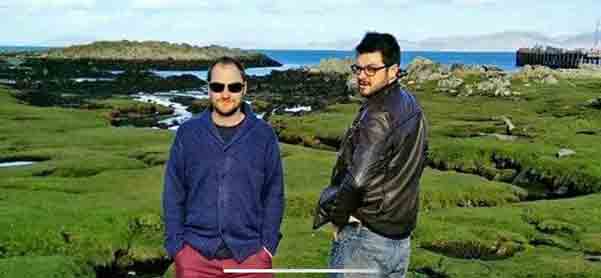
Alan: Many thanks for this chat. Enjoyed it, and getting to know you better. Anything else you want to tell me about?
Innes: Thank YOU for your time. I enjoyed it too. I guess we’re friends now. Speak to you soon? I hope so.
